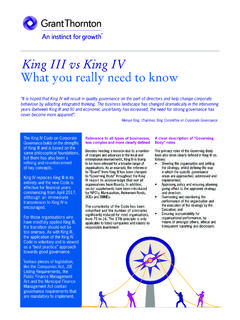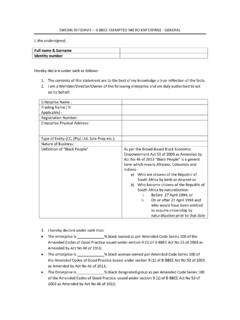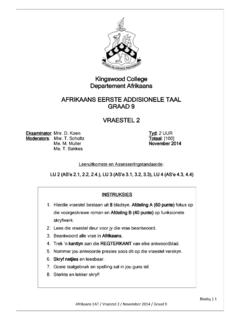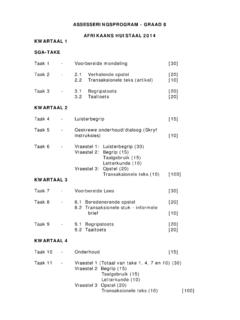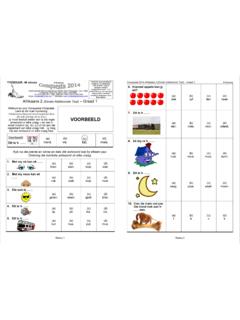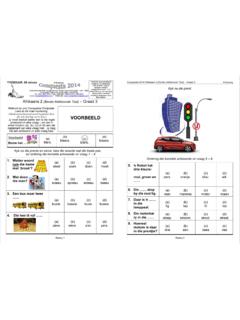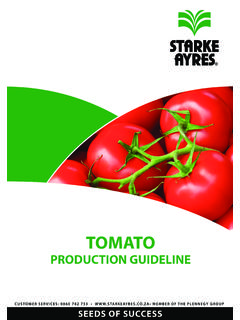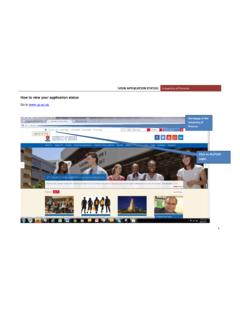Transcription of 2014/2015 A guide to establishing a presence in …
1 A guide to establishing a presence in south Africa2014/2015 Nelson Mandela1918 2013 ForewordSouth Africa celebrates 20 years of democracy in 2014 and over the past two decades has become an important economy both on the African continent and the global stage. In its 2014 Doing Business in south Africa report, the World Bank rated south Africa as one of the easiest economies in the sub-Saharan region for doing business; with a global ranking of 41, the country far outstrips the regional average of 147, reiterating its position as a springboard for investment into the rest of the continent. As a member of the Southern Africa Development Community, south Africa offers investors access to a region with current GDP growth of 6%.While the south African economy has a marked duality, with an informal economy operating in tandem with its globally recognised sophisticated financial and industrial economy, investors can expect a well capitalised banking system and highly developed regulatory systems.
2 This includes top ranked audit and accounting standards, a well-regulated stock exchange and world-class commercial legislation governing competition policy, copyright, patents and trademarks. The country s modern infrastructure supports the efficient distribution of goods throughout the southern African region and the government has committed to an ongoing infrastructure development programme. The Infrastructure Development Bill was passed by Parliament in March 2014 , ensuring that the south African infrastructure grows sufficiently to serve the expanding economy and with all developing economies, south Africa faces challenges including high levels of unemployment. This is a key priority for the government and forms the basis of the New Growth Path and the National Development Plan, a strategic roadmap which outlines a broad range of interventions that, by 2030, aim to expand economic opportunities for all by improving the country s skills base and infrastructure, eliminating poverty and reducing inequality.
3 This guide to establishing a presence in south Africa is Grant Thornton s practical pocket guide that outlines the key aspects for business investment in the country. If you are planning on doing business in south Africa, it s vital that you understand the investment environment and have all the information necessary on the legal, accounting and taxation frameworks to ensure that you are doing it right. This reference guide will provide you with the key fundamentals that you need to know. More detailed information can be found on our website Rolihlahla Mandela (1918 2013) was a south African politician and activist. On April 27, 1994, he was made the first President of south Africa elected in a fully represented democratic election. Mandela was also the first black President south Africa. He served as the President of the African National Congress (ANC) from 1991 to 1997.
4 Internationally, Mandela was the Secretary General of the Non-Aligned Movement from 1998 to Country profile 2 Stability marks south Africa as a viable investment option 4 Grant Thornton: helping you do business in Africa 4 Government trade and investment agencies 5 Regulatory requirements 6 Tax10 Finance 11 Broad-based black economic empowerment 12 Labour12 Residence and immigration15 Contact us Country profileArea 1, 221 million square kilometresPopulation 53 million (2013, mid-year estimate)Currency Rand (R1 = 100 cents)Time GMT + 2hrsDialling code +27 Official name Republic of south AfricaCapitals Cape Town (Legislative) Pretoria (Executive) Bloemfontein (Judicial)Head of State President Jacob ZumaRuling party African National Congress (ANC) Form of State Federal / unitary hybrid, comprising a central government and nine provincial governmentsLegal system Based on Roman Dutch law and 1996 ConstitutionLanguages English is the language of commerce, banking, government and official documentation.
5 There are eleven official languages: Afrikaans, English, IsiNdebele, IsiXhosa, IsiZulu, Sesotho, Northern Sotho, Setswana, SiSwati, Tshivenda and XitsongaTotal GDP $ billion (2012)GDP per capita $11,021 (2012)Real GDP growth (2012)Stability marks south Africa as a viable investment optionStability and normality may not be words that excite but when they apply to a country in which you re considering investing, they re precisely the words that engender confidence. In its latest annual Global Competiveness Report, the World Economic Forum (WEF) ranks south Africa 53rd of 148 economies. south Africa is now a $400bn economy whose Johannesburg Stock Exchange (JSE) broke the technically important 49,000 point barrier in May 2014 . Interestingly, this occurred the day after the national election that marked 20 years of democracy.
6 Critical thinkers point to this as a clear indication of just how normal the country s political life has become, adding to a high level of the most efficient infrastructure network in Africa, sub-Saharan Africa is south Africa s second highest export market after Europe and on a par with China, which is itself increasing significantly; China has made no secret of its interest in actively capitalising on and supporting south Africa s economic growth. Not only does this make south Africa a practical and efficient platform as the base to launch an African strategy, it gives investors an export market that is growing at according to a recent and comprehensive Goldman Sachs report into the is worth noting that, for four consecutive years, the Word Economic Forum has ranked the JSE first in regulation of securities exchanges, an unexpected indication of the quality of the country s business infrastructure, institutions, efficiency, and market sophistication.
7 Above all, it speaks to south Africa s international business sensibility; it is a member of the G-20 and experienced at taking its place at international tables while actively contributing to growing economic stability in its region. 2 Excellent economic and financial management teams are among the hallmarks of the country s success. Adding to investor confidence is the fact that south Africa s local investment community is well-developed with access to capital, while the market has a high level of participation from foreign investors. Name almost any large multi-national and you will find it active and, indeed, thriving in south Africa. Importantly, the country has the support of organisations like the IMF, which is all too aware of the significance of its success to the stability of the increasing employment is high on south Africa s list of priorities and is innovatively supported by both government and business, the rise of the African middle class is an important demographic agreementsSouthern African Customs Union (SACU) south Africa is a member of the SACU which allows for duty and quota-free access to the markets of member states.
8 The SACU comprises of Botswana, Lesotho, Swaziland, Namibia and south Africa. SACU entered into a free trade deal with the four-nation European Free Trade Association on 1 July 2006 but its negotiations with the United States for a free trade agreement have Southern African Development Community (SADC) SADC members include Angola, Botswana, Democratic Republic of Congo (DRC), Lesotho, Madagascar, Malawi, Mauritius, Mozambique, Namibia, Seychelles, south Africa, Swaziland, Tanzania, Zambia and Zimbabwe. The SADC Trade Protocol was developed as part of a strategy to stimulate industrial development, boost trade and investment and to liberalise intra-regional trade in goods and services among member states. The SADC Free Trade Agreement was fully implemented in 2012 which will make more than 90% of the trade in this region African Community (EAC) The EAC has its own customs union that rationalises investment and investment incentives through promoting the community of Burundi, Kenya, Rwanda, Tanzania and Uganda as a single investment area.
9 With a population of more than 120 million, the EAC is one of the largest single-bloc regional markets in Africa which is made even bigger by a series of mutually beneficial partnerships with regional blocs such as SADC, boasting a combined population well over 400 million. The African Growth and Opportunity Act (AGOA) The African Growth and Opportunity Act (AGOA) provides duty-free access to the USA market for almost all products exported from more than 40 eligible sub-Sahara African countries, including south Africa. AGOA covers over 7 000 products, including mineral fuel (coal), machinery, vehicles, agricultural products, fruit and vegetables, iron, steel and certain automotive components. A survey of 80 of the largest 600 US companies operating in south Africa has revealed that they have created more than 150 000 jobs and contribute to a combined yearly revenue of over R233-billion to south Africa alone through AGOA.
10 The AGOA Act expire as US law in 2015 but submissions by the south African government and other interested parties are currently under way to extend it by another 15 years. President Barak Obama in a 2013 visit to south Africa made a commitment to try and help extend Thornton: helping you do business in AfricaOur African footprintBecause of growing consumerism and international trade, Africa has become an incredibly attractive proposition for foreign investors worldwide. In Africa, Grant Thornton member firms operate in Algeria, Botswana, C te d Ivoire, Egypt, Ethiopia, Gabon, Guinea, Kenya, Libya, Mauritius, Morocco, Mozambique, Namibia, Nigeria, Senegal, south Africa, Togo, Tunisia, Uganda, Zambia and business centreBased in Johannesburg is Grant Thornton s accredited International Business Centre (IBC) which serves as a gateway to expert resources across the global organisation to provide seamless services across borders.
